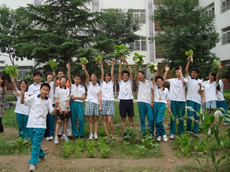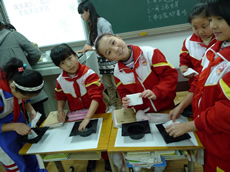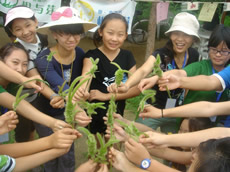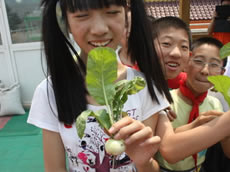By Li Yizhi (Project Coordinator, Roots and Shoots Programme)
|
Editor’s Note: Roots & Shoots is an environmental educational programme for youths founded by ethologist Dr Jane Goodall. It has local chapters in 132 countries. Through participatory environmental education programmes, youths and teenagers are encouraged to engage in extracurricular activities on environmental protection, wildlife conservation, and community concern. Since 2010, PCD has been supporting Roots & Shoots programmes in Beijing, such as community organic farming for parents and children and 'Mind Cultivation', a programme on community farming and campus farming. In the latter, school teachers and students explore the relationship between farming and their own life as well as sustainable living. In this article, the writer relates stories of campus farming and looks at how farming helps children to grow and learn how to live sustainably. |

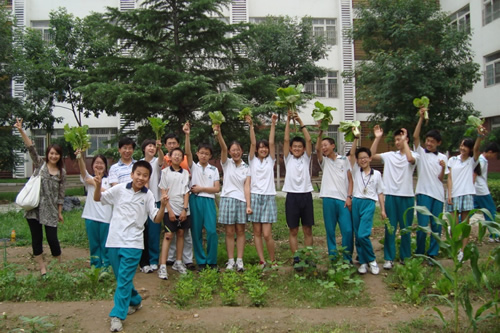 |
| Harvesting in the vegetable garden of one of the branch schools of Beijing Jingshan School. |
“Only if we understand can we care. Only if we care will we help. Only if we help shall all be saved.” These words of Dr Jane Goodall, founder of the Roots & Shoots programme and author of Harvest for Hope, are the most appropriate to describe the purpose of the Mind Cultivation programme.
Today, over half of the population in China has become urbanised. More and more people are born and grow up in steel and cement jungles. As they become separated from the land, they stop thinking about the relationship between food and themselves or that between the land and their inner being. We till the land and we also cultivate our minds. By engaging teenagers directly in farming, 'Mind Cultivation Scheme—Educational Programme on Organic Farming' aims to help teenagers learn where food comes from, the process from field to table, and to reflect on our lifestyle.
The Mind Cultivation scheme was launched in the spring of 2011. Since then, it has been facilitating university and school students to farm on their campuses. Not only have we been growing seasonal fruits and vegetables with students, we have also been showing documentaries on organic farming, organising sharing on farming experience, conducting farm labour vacations and facilitating experiential activities in organic vegetable growing.
Roots & Shoots and PCD want to explore how farming affects education. As programme organiser, we ourselves had little foreknowledge this. What we do is to be at the side of teachers and students and grow together with them. In schools where the Mind Cultivation scheme is running, there are all sorts of stories surrounding farming. I think these stories more or less show how education may be affected by farming.
Farming Fosters Diverse Learning
Two teachers and a group of Year 6 and Year 7 students of the Yuanyang Branch of Beijing Jingshan School transformed a small piece of land in their campus into a vegetable garden. But this garden is now also much more than a space for growing vegetables. The biology teacher brings students here to teach them about plants and their roots, stems, leaves, flowers and fruits. The English teacher teaches students English nouns in front of the vegetables. The Chinese language teacher tells students to observe the crops and write an essay. Year 1 and Year 2 students come here with their teachers to weed and to learn about cooperation and solidarity… A small vegetable garden has thus become a base for teaching all subjects! This small patch, called Mind Cultivation Garden, is run under a contracting system. Students work in groups to take care of it. While the teachers and the caretakers help in running the farm, the students go to the field every day after school to look at the plot that they have 'contracted', and to weed and water it. Sometimes even parents join in.
In the summer vacation, the students stay home but the vegetables that they grow are always on their minds. One summer, the teachers were working in the office. Outside, it was raining heavily. Then Zhou, the teacher responsible for the Mind Cultivation project, suddenly noticed that there were two persons in the vegetable garden. Carrying umbrellas, they walked slowly. They stopped at the side of the maize. Zhou then saw that it was the student who had grown the maize and her mother. The student had been worried about the maize because of the strong wind and rain and had come to look at it when the rain had eased slightly. Her mother was anxious about her child going out on her own, so she had come with her. Children in the urban area have always enjoyed the full attention of their one-child families and are taken care of all the time. After taking part in farming, they begin to feel that they have their own responsibilities. Looking after their crops becomes a problem that they think about daily. The child was worried about her maize, and the mother was worried about her child—a transference of love, I thought.
Children Experiencing Caring and Giving
Beijing Experimental School for the Deaf is a special school for children with impaired hearing. Chen, a teacher at the school, is the mother of a student taking part in the Roots & Shoots programme, so she brought its activities to her own school. Chen attaches a lot of importance to the nurturing of her students’ inner being. Under her guidance, her students have started to grow potted plants in the classroom, and to learn about the meaning of caring and giving. In the beginning, the vegetables were always infected by aphids and the students hated insects and worms. With the help of volunteers, they saw that these creatures are living things too. However they still don't like to see their vegetables, grown with so much effort, being damaged by insects. In between classes, they use brushes to clean the vegetable leaves. In this way they protect their potted vegetables by driving insects away from the plants instead of killing them.
“In the future we will buy only damaged vegetables!”
Apart from farming on campus, students and teachers also visit organic farms. Labouring in farms provides them with an experience very different from that of city life. They are woken at five or six o’clock in the morning. They then go to the field to pick fresh vegetables. After inspection and selection, the vegetables are packaged and sent to numerous families.
On one occasion, it had rained heavily the night before. The students realised that among the eight ripened tomatoes on a tomato plant we saw that day, only one would end up on a customer's table. The rest either had insect bites, or were damaged or too ripe and soft for packing. They would have been sent to the compost pit or used to feed pigs. Since the students hated to see fruits of their harvest being thrown away, they begged to bring them back to their campsite so that they could be turned into food. In the two days of work camp, we made fried tomatoes, tomato salad, tomato soup, tomato ground pork noodles… When the camp came to an end and the students had to go home, one of them said: “When I’m home, I’ll tell my mother to buy only damaged vegetables. Farmers work very hard and all fruits of labour should be cherished!” Everyone laughed at these words, but such experience must have left a very deep impression on students and teachers. They will cherish food in the future because they realise how much care and effort went into growing it. They also realised how hard it is to practice organic farming. But after eating tomatoes every day for so long, they all said they didn't want to eat any more tomatoes in the coming month…
A small vegetable garden brings people closer emotionally, and closer to nature as well. In schools that we visited, the vegetable garden on every campus has become an ecological island in the city. All kinds of insects and birds can be seen around the garden. We have unintentionally built a habitat for wildlife as well. Nature is not so far away after all. We can keep it right beside us through our own efforts.
Mind Cultivation has many stories, and campus farming is very interesting. As the programme coordinator, I have a lot to share. Tilling the land and cultivating the mind—how does farming affect education? What sort of reflection does campus farming bring us? How should we promote sustainable living in schools? We hope that there are more partners who will join us in looking for colourful answers to campus farming.


